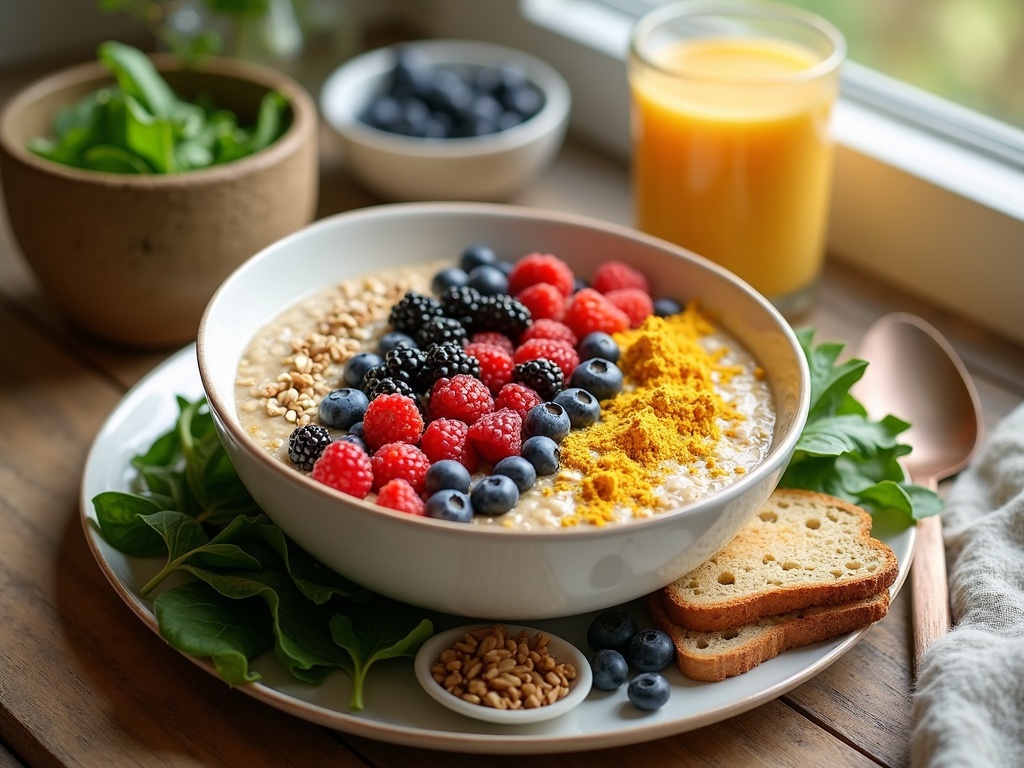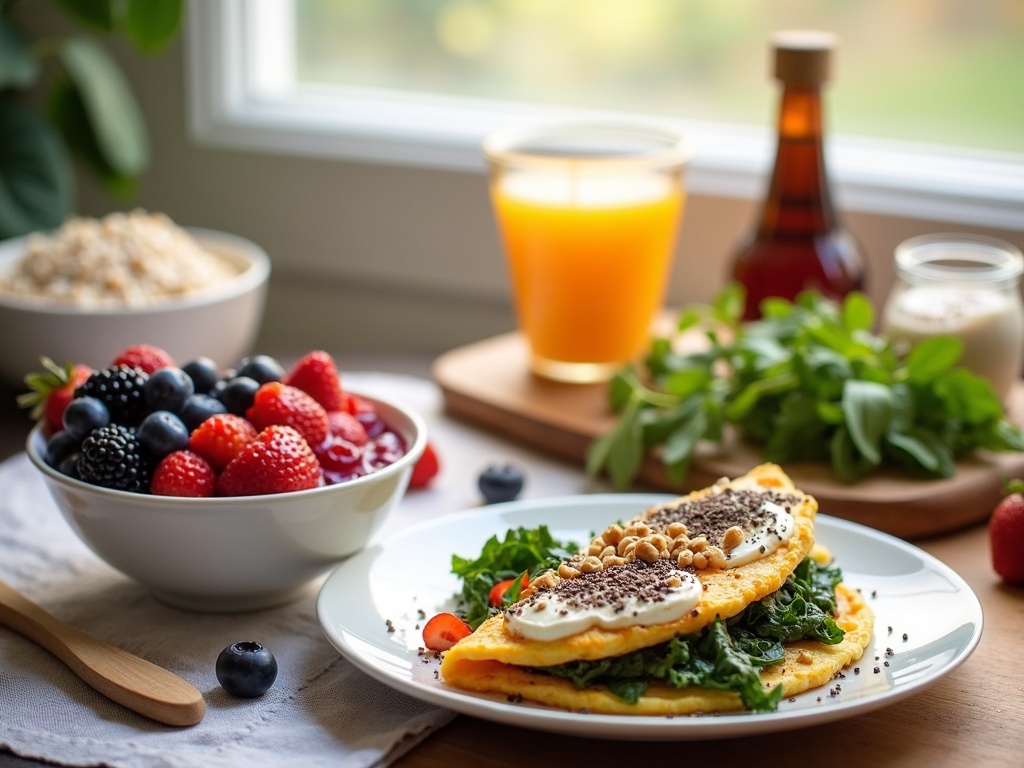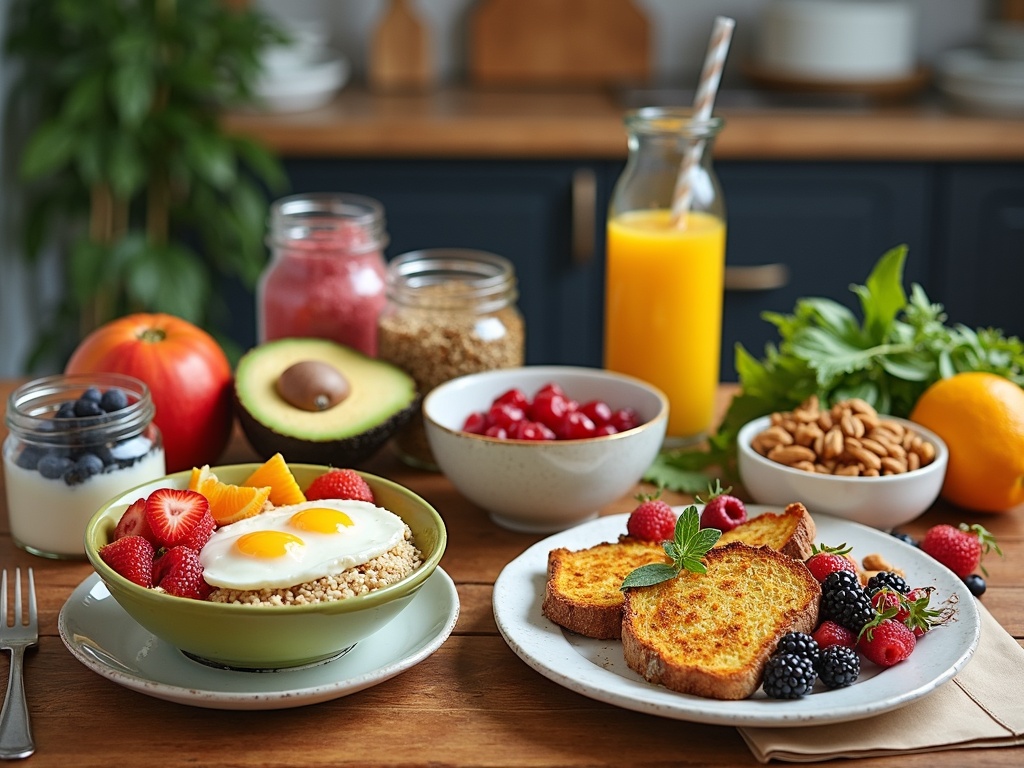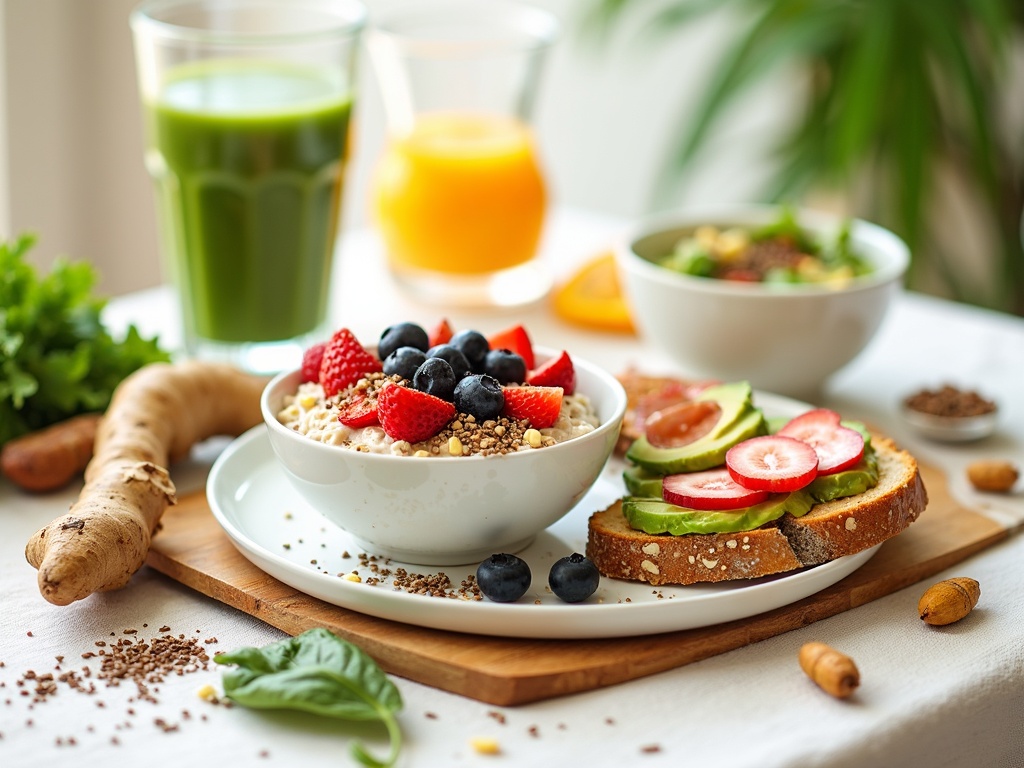Chronic inflammation sits at the root of serious health conditions like diabetes and heart disease, but I’ve found that adding anti-inflammatory foods to breakfast can cut inflammation markers by up to 40% in just weeks. Starting my day with nutrient-rich ingredients like berries, leafy greens, and omega-3-packed seeds fights inflammation while stabilizing blood sugar and boosting my energy levels throughout the day.
Find In This Article
Key Takeaways
- Berries, leafy greens, nuts, and seeds are powerful anti-inflammatory ingredients that easily incorporate into morning meals.
- Whole grains like oats contain fiber that feeds beneficial gut bacteria, reducing systemic inflammation.
- Adding spices like turmeric and cinnamon to breakfast provides additional anti-inflammatory compounds.
- Maintaining stable blood sugar levels through balanced breakfast choices helps prevent inflammatory responses.
- Preparing components in advance, like overnight oats or pre-portioned smoothie ingredients, makes anti-inflammatory breakfasts more sustainable.
Why Anti-Inflammatory Foods Matter for Your Morning Meal
Starting my day with an anti-inflammatory breakfast has completely transformed my morning energy levels and overall health. I’ve discovered that what I eat first thing in the morning doesn’t just satisfy hunger—it sets the metabolic tone for my entire day.
The Connection Between Inflammation and Disease
Chronic inflammation isn’t just a buzzword—it’s a serious health concern linked to several major diseases. When left unchecked, persistent inflammation in the body becomes a driving force behind obesity, diabetes, heart disease, and even cancer. This silent process damages cells and tissues over time, creating the perfect storm for disease development.
What’s eye-opening is how quickly dietary changes can make a difference. Studies show that an anti-inflammatory diet can reduce inflammation markers in the body by up to 40% within just a few weeks. This remarkable improvement comes primarily from foods rich in antioxidants, healthy fats, and fiber—all of which can be easily incorporated into a healthy breakfast.
The morning meal deserves special attention because it breaks the overnight fast and influences how our metabolism functions throughout the day. When I consume a balanced breakfast containing anti-inflammatory components, my blood sugar levels remain more stable, reducing the inflammatory response that can occur with blood sugar spikes.
Key Anti-Inflammatory Ingredients for Breakfast
I’ve found several powerful anti-inflammatory ingredients that work perfectly in morning meals:
- Berries (blueberries, strawberries, blackberries) contain anthocyanins that fight inflammation
- Leafy greens like spinach and kale pack antioxidants and vitamin K
- Nuts and seeds provide omega-3 fatty acids and healthy protein
- Turmeric and ginger offer potent anti-inflammatory compounds
- Whole grains supply fiber that feeds beneficial gut bacteria
These ingredients are incredibly versatile and can be combined into countless healthy breakfast options from smoothie bowls to savory breakfast plates.
For those short on time, I’ve found that preparing overnight oats with chia seeds delivers an antioxidant-rich start with minimal morning effort. The combination of oats and chia creates a perfect base for adding anti-inflammatory fruits, nuts, and spices.
What makes an anti-inflammatory approach so effective is that it’s not a restrictive diet but rather an inclusive eating pattern that emphasizes certain foods. By focusing on colorful fruits and vegetables, I ensure a wide spectrum of phytonutrients that combat oxidative stress and inflammation.
Protein plays a crucial role in a healthy filling breakfast with anti-inflammatory benefits. Quality protein sources like Greek yogurt, eggs, or plant-based options help maintain muscle mass while providing essential amino acids that support immune function.
The timing of breakfast also matters. I’ve found that eating within an hour of waking helps regulate cortisol levels, which can influence inflammation when imbalanced. This simple habit, combined with choosing anti-inflammatory foods, creates a powerful morning routine.
For anyone concerned about heart health, an heart healthy breakfast with anti-inflammatory components can address multiple health goals simultaneously. Oats, for example, contain beta-glucans that help lower cholesterol while also providing anti-inflammatory benefits.
I’ve learned that making small, consistent changes yields the best results. Starting with a simple healthy breakfast featuring just one or two anti-inflammatory ingredients is more sustainable than a complete diet overhaul. Over time, I’ve expanded my morning menu to include a wider variety of inflammation-fighting foods.
By prioritizing anti-inflammatory foods at breakfast, I’ve created a morning ritual that not only tastes good but actively supports my long-term health goals, setting a positive tone for balanced eating throughout the day.

Power-Packed Ingredients to Include
I’ve discovered that creating a healthy breakfast with anti-inflammatory properties starts with selecting the right ingredients. These powerful foods can help reduce inflammation while providing essential nutrients to kickstart your day.
Foundation Elements for Fighting Inflammation
Berries are my go-to morning superfoods. Blueberries, strawberries, and blackberries contain anthocyanins—powerful antioxidants that fight inflammation at the cellular level. I add a handful to my morning smoothies or sprinkle them over my overnight oats with chia seeds for a double anti-inflammatory punch.
Leafy greens might not seem like traditional breakfast fare, but they’re packed with vitamins and anti-inflammatory compounds. I often add spinach or kale to morning smoothies or fold them into omelets. The dark green color signals their rich antioxidant content, which helps neutralize harmful free radicals.
Nuts and seeds provide essential omega-3 fatty acids that actively combat inflammation. Walnuts, flaxseeds, and chia seeds are particularly effective options. I sprinkle these on yogurt bowls or blend them into healthy filling breakfast smoothies for sustained energy.
Whole grain oats deserve special attention in any anti-inflammatory breakfast plan. Their soluble fiber feeds beneficial gut bacteria, which plays a crucial role in reducing systemic inflammation. Steel-cut oats take longer to digest, providing steady energy without blood sugar spikes that can trigger inflammation.
Greek yogurt delivers both protein and probiotics for a simple healthy breakfast. The live cultures support gut health, which is increasingly linked to reduced inflammation throughout the body. I opt for plain varieties and add my own flavorings to avoid added sugars.
For sweetness without inflammation, natural sweeteners like honey or maple syrup can be used sparingly. These options contain beneficial compounds that processed sugars lack. A small drizzle goes a long way in creating a heart healthy breakfast that satisfies sweet cravings without triggering inflammatory responses.
Incorporating these ingredients into your morning routine doesn’t require complicated recipes. Simple combinations like berry-topped yogurt with nuts, vegetable omelets with avocado, or healthy breakfast options like overnight oats with seeds provide powerful anti-inflammatory benefits while keeping breakfast interesting and delicious.

Quick and Easy Anti-Inflammatory Breakfast Ideas
Starting my day with anti-inflammatory foods has made a huge difference in how I feel. I’ve collected some simple breakfast options that take just minutes to prepare but deliver powerful anti-inflammatory benefits.
Nutrient-Packed Morning Starters
A green smoothie is my go-to when I’m rushing out the door. I blend 1 cup of spinach with 1/2 cup of mixed berries and a tablespoon of chia seeds. This combination provides antioxidants that fight inflammation while keeping me full until lunch.
Hearty oatmeal never disappoints when I need something warming. I cook 1/2 cup of oats and top it with sliced banana, a handful of berries, a drizzle of honey, and crushed walnuts. Oats contain beta-glucan, a fiber that helps reduce inflammation markers in the body.
For a protein-rich option, I prepare a yogurt parfait by layering 1 cup of Greek yogurt with fresh berries and a sprinkle of flaxseeds. The probiotics in yogurt support gut health, which plays a crucial role in managing inflammation.
When I know I’ll have a busy morning, I make overnight oats with chia seeds the evening before. I mix 1/2 cup of oats with plant-based milk, add chia seeds and cinnamon, then refrigerate. By morning, I have a ready-to-eat healthy filling breakfast packed with anti-inflammatory ingredients.
For days when I crave something savory, whole grain toast topped with mashed avocado, thinly sliced radishes, and pumpkin seeds hits the spot. Avocados contain monounsaturated fats that help fight inflammation, while pumpkin seeds add zinc and magnesium.
These healthy breakfast options can be customized based on your preferences and what you have available. The key is incorporating ingredients with known anti-inflammatory properties:
- Colorful berries rich in antioxidants
- Leafy greens like spinach with vitamin K
- Omega-3 rich seeds such as chia, flax, and pumpkin
- Whole grains that contain fiber
- Healthy fats from avocados and nuts
Adding these heart-healthy breakfast ideas to your morning routine provides a delicious way to combat inflammation and start your day with foods that help your body function at its best.
Customizing Your Anti-Inflammatory Breakfast
Starting my day with an healthy breakfast that fights inflammation has been a game-changer for my energy levels and overall wellness. The beauty of anti-inflammatory breakfasts is how easily they can be personalized to suit different dietary needs, taste preferences, and nutritional goals.
Plant-Based and Dairy-Free Options
For those following a plant-based lifestyle or dealing with dairy sensitivities, several delicious alternatives can replace traditional yogurt in breakfast bowls:
- Almond yogurt provides a nutty flavor profile while delivering beneficial plant proteins
- Coconut yogurt offers a creamy, tropical taste that pairs perfectly with fruits
- Cashew yogurt creates an ultra-smooth base for granola and seed toppings
- Oat yogurt works well for those with nut allergies while still providing probiotics
I’ve found that mixing these alternatives into overnight oats with chia seeds creates a protein-rich breakfast that keeps inflammation at bay. For a quicker option, simply top your dairy-free yogurt choice with anti-inflammatory fruits, nuts, and spices.
Spices aren’t just flavor enhancers—they’re powerful inflammation fighters. Cinnamon helps regulate blood sugar levels, which is critical since blood sugar spikes can trigger inflammatory responses. I add a quarter teaspoon to oatmeal, smoothies, or yogurt bowls. Turmeric contains curcumin, a compound with remarkable anti-inflammatory properties. Combining it with black pepper enhances absorption, so I sprinkle both into my morning smoothies or golden milk.
Nut butters add protein, healthy fats, and a satisfying creamy texture to any healthy filling breakfast. While almond butter is my go-to for its vitamin E content and mild flavor, pecan butter offers a richer taste profile with similar anti-inflammatory benefits. Even a tablespoon drizzled over whole-grain toast or stirred into oatmeal can help control hunger and provide sustained energy.
Berry combinations are where I get creative with my simple healthy breakfast options. Each berry variety provides a unique antioxidant profile:
- Blueberries contain anthocyanins that help repair cell damage
- Strawberries provide vitamin C for immune support
- Blackberries offer high fiber content for gut health
- Raspberries deliver ellagic acid, which helps reduce inflammation
I rotate berry types throughout the week to ensure I’m getting a wide spectrum of anti-inflammatory compounds. A particularly effective combination is blueberries with blackberries for maximum antioxidant power.
For added texture and nutritional benefits, I include seeds like flax, chia, or hemp. These tiny powerhouses are rich in omega-3 fatty acids, which are key players in fighting inflammation. Just a tablespoon sprinkled over your breakfast bowl or blended into a smoothie makes a significant difference.
By keeping a variety of these ingredients on hand, I can create a different heart healthy breakfast each day without getting bored. On busy mornings, I might simply combine almond yogurt with cinnamon, a handful of mixed berries, and a drizzle of pecan butter. When I have more time, I might prepare a warm quinoa breakfast bowl with turmeric, almond butter, and fresh fruits.
The flexibility of anti-inflammatory breakfast ingredients means I can adapt my morning meal to suit seasonal availability, budget constraints, or healthy breakfast options I have on hand. This customization not only keeps my taste buds happy but ensures I’m consistently nourishing my body with inflammation-fighting foods every morning.
Common Mistakes to Avoid
Many people trip up when trying to create an anti-inflammatory breakfast without realizing it. I’ve spotted several recurring issues that can undermine your health goals. Let me walk you through these pitfalls so you can sidestep them in your morning routine.
Hidden Inflammatory Triggers
The breakfast aisle is packed with misleading options that seem healthy but actually work against your anti-inflammatory goals:
- Store-bought granola often contains shocking amounts of added sugars, artificial flavors, and preservatives that trigger inflammation. Check labels carefully for hidden sugars like corn syrup, dextrose, or evaporated cane juice.
- Skipping seeds and nuts means missing out on essential fiber and omega-3 fatty acids. A tablespoon of chia seeds or ground flaxseed can dramatically boost your breakfast’s anti-inflammatory properties.
- Choosing fruit juices instead of whole fruits strips away fiber while concentrating sugars. This causes blood sugar spikes that promote inflammation. Opt for a whole apple or berries to get the full spectrum of benefits.
- Overlooking protein is a common error that leaves you hungry and reaching for inflammatory snacks later. Including eggs, Greek yogurt, or plant-based options like hemp seeds gives your breakfast staying power.
- Not including healthy fats is a missed opportunity for fighting inflammation. Avocado, olive oil, or a spoonful of almond butter provides the fat your body needs to absorb nutrients properly and create a filling breakfast that keeps hunger at bay.
I’ve found that making simple swaps can transform your morning meal from inflammatory to healing. For example, replace sugary cereal with simple steel-cut oats topped with berries and walnuts. Or trade your white toast and jam for avocado on whole grain bread with a sprinkle of turmeric.
The timing of your heart-healthy breakfast matters too. Eating too late in the morning after a long overnight fast can trigger stress hormones that promote inflammation. I suggest aiming for a consistent breakfast time that works with your schedule.
By avoiding these common pitfalls, you’ll create healthy breakfast options that actively fight inflammation rather than fuel it. Each small change adds up to meaningful improvements in how you feel throughout the day.
Making It Work for Your Lifestyle
I’ve discovered that the key to maintaining an anti-inflammatory breakfast routine isn’t just about choosing the right foods—it’s about creating systems that fit into your life. Let’s explore practical strategies to make anti-inflammatory breakfasts sustainable, regardless of your schedule or preferences.
Preparation Strategies for Busy Mornings
Time constraints often lead us to less healthy breakfast choices. I’ve found that dedicating 1-2 hours on weekends for meal prep can transform your entire week. You can prepare several components in advance:
- Chop fruits and store them in airtight containers
- Cook a large batch of steel-cut oats to reheat throughout the week
- Prepare chia seed puddings or overnight oats with chia seeds in individual jars
- Wash and portion leafy greens for morning smoothies
- Toast nuts and seeds, then store in small containers for easy grabbing
This approach has saved me countless morning hours while ensuring I still enjoy healthy, filling breakfasts that fight inflammation.
For storage, glass containers work best for prepared ingredients as they don’t leach chemicals. I separate components that should remain crisp from those that contain moisture. For example, I store toasted nuts separately from fresh berries until just before serving.
Smart storage extends the life of your anti-inflammatory ingredients. Berries last longer when washed just before eating, not in advance. Leafy greens stay crisp when wrapped in a slightly damp paper towel before refrigeration. Turmeric root can be frozen and grated directly into your breakfast when needed.
To prevent menu fatigue, I rotate between 3-4 different healthy breakfast options each week. Monday might feature a turmeric smoothie bowl, Tuesday an avocado toast with poached eggs, Wednesday a warm quinoa breakfast bowl, and Thursday circling back to a variation of Monday’s smoothie with different fruits.
The beauty of anti-inflammatory eating is its flexibility. I might enjoy a warming ginger and cinnamon oatmeal during winter months, then switch to cooling simple, healthy breakfast options like chia seed pudding topped with fresh berries during summer.
Individual nutritional needs vary significantly. Athletes or highly active individuals might need larger portions or additional protein sources in their anti-inflammatory breakfasts. Someone managing specific inflammatory conditions might emphasize certain ingredients like omega-3 rich foods. I always recommend adjusting portion sizes and macronutrient ratios based on your personal energy requirements and health goals.
Seasonal eating not only provides variety but often delivers more nutritional benefits. Fruits and vegetables consumed in season typically contain higher levels of antioxidants and phytonutrients. In summer, I capitalize on fresh berries, which are powerful inflammation fighters. During winter months, I pivot to citrus fruits rich in vitamin C and pomegranates packed with polyphenols.
Cost can be another consideration when making healthy breakfast choices. Buying anti-inflammatory staples like oats, flax seeds, and turmeric in bulk reduces overall expense. For pricier items like berries, I buy frozen when fresh isn’t affordable or in season.
For especially hectic mornings, I keep emergency options ready—like individual smoothie packs in the freezer or heart-healthy breakfast muffins made with anti-inflammatory ingredients like blueberries, walnuts, and ground flaxseed.
The most sustainable approach is one that fits your unique lifestyle. I find that anti-inflammatory breakfast routines work best when they adapt to your changing needs rather than forcing you to adapt to rigid rules.

Sources:
The Journal of Nutrition
Anti-Inflammatory Foods: Effects on Chronic Inflammation Study
American Journal of Clinical Nutrition

